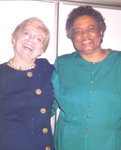

Like any school principal, Tristen Perlberg has many responsibilities, great and small, but one that’s unique to the principal of Margaret B. Pollard Middle School is addressing a recurring question.
“I do get asked who Margaret Pollard was,” said Perlberg, now halfway through his first year as head of the middle school in north Chatham and the school’s former assistant principal.
“I respond with how she was a politician and a huge advocate for Chatham County,” he said. “She became the first African-American woman to chair the Chatham County Board of Commissioners.”
Pollard’s memory lives on in many ways, not merely in the middle school’s name.
A large portrait of the school’s namesake hangs outside the front office and every year, Perlberg said, students and staff honor Pollard on her birthday.
“We do this by sharing with the students who she was and all of the great things she did for our county,” he said.
Last year, on her birthday, students wrote essays about the late county leader.
Born on May 3, 1932, Margarete Bryant Pollard died on Sept. 16, 2009, and filled most of the 77 years in between — certainly all of her adult life — with service in the public sector.
Ten of those years, from 1994 to 2004, Pollard — a lifelong Democrat — served as a county commissioner.
“Margaret only worked in the public sector,” said her daughter, Miriam Pollard, who now lives and works in Maryland. “She was a true public servant.”
Many who knew Pollard, including former colleagues on the Board of Commissioners Betty Wilson, of Pittsboro, and Siler City Mayor John Grimes, have described the intensive research she conducted on issues that required her input. This work ethic was rooted, her daughter said, in her professional life, particularly the years Pollard spent working in public health.
“Data driven methods are a requirement in public health and this demand shaped Margaret’s thinking,” said Miriam. “Also, we learn as blacks that to be recognized we must be ‘twice as good to get half as much.’ This motto rings throughout the leadership class of the black community.”
Pollard was the granddaughter of a slave and this, her daughter said, “impacted her significantly. As she grew in life, Margaret became more aware of the powerlessness of women and more significantly, to her, the powerlessness of women of color. This was a fight she was determined to conquer.”
Pollard grew up, alongside several brothers and sisters, on the family’s farm in Moncure, where her parents harvested cotton.
“Margaret and her mother were close in ways unimaginable,” said Miriam. “Mrs. Bryant was a strong, compassionate mother who did not want her daughters to be slaves to their bodies and was a midwife who let her girls know they had to graduate from college before becoming mothers.”
As a young girl, Pollard excelled as a student. She graduated from Pittsboro’s Horton High School (at the time, the county’s segregated high school, now Horton Middle School, named after slave poet George Moses Horton) as the class valedictorian. She graduated from North Carolina College at Durham (now North Carolina Central University) with a bachelor’s degree in biology and a master’s degree in public health. Her career included stints teaching in public schools, working as a health educator in Greensboro, and later working with the Dental Division of the North Carolina State Health Department. Prior to her service as a county commissioner, Pollard was an adjunct professor of public health at the University of North Carolina at Chapel Hill.
Pollard’s career path wasn’t an easy one. Because of the color of her skin, not all doors were open to her, according to her daughter.
“Even though Margaret was valedictorian of her high school and college classes, the Chatham Jim Crow only had doors for her to be a teacher,” Miriam said. “Margaret knew she had more to give on a much different platform. Margaret was a health educator and a community architect. Her dream lived in Maryland, where she wrote the first proposal for elderly housing. Margaret was compassionate for the needs of the powerless and the poor.”
Chatham County Board of Education member Del Turner, who was on the school board when it honored her with the naming of the county’s then-newest middle school, knew Pollard and remembered the late leader in a recent interview.
“She was a good person,” recalled Turner. “She was a wise person. She was calm, never got too excited. She always studied issues very carefully and always gave her best advice. She was thoughtful and caring and she was a great public servant.”
John Grimes, who was the first Republican elected to the Chatham County Board of Commissioners since Reconstruction following the Civil War, worked with Pollard on the county board in the 90s.
“She always seemed to want to do what was best for all of Chatham County,” Grimes recalled. “She was not a person who had just one or two issues that were dear to her. She was always working on something, and she was dear lady.”
Wilson, Pollard’s colleague on the county Board of Commissioners and a friend for years, said Pollard is never far from her thoughts today.
“I miss Margaret every day,” she said. “When we were commissioners, we traveled all over the county, meeting people. She loved to be around people and always wanted to be inclusive. At the state legislature, it seemed like she knew everybody.”
One of Wilson’s daughters, school board member Jane Allen Wilson, also knew Pollard, recalling her “strong commitment to public service.” She also fondly remembered Pollard’s personal style, namely the large, floppy hats Pollard favored.
“Margaret was known for her outlandish hats,” said Wilson, who today owns one, a gift presented to her after she expressed a liking for it.
Pollard’s dedication to public service wasn’t without cost in her personal life, her daughter said.
“Doing all Margaret did for the community left her no time to parent,” said Miriam, whose parents (her father is the late Burhett Pollard) divorced. “June Cleaver she was not, or Clare Huxtable.”
While their relationship wasn’t without complications, Miriam said she was grateful for the many ways her mother helped shape her, including teaching her to read before starting school at the age of four.
“My mom gave me freedom not to be a traditional girl in a box,” said Miriam. “That was the best thing she could have done for me in the Southern Bible Belt. I have been able as a former teacher to promote girls in science and medicine. That alone is huge.”
She also inherited her mother’s confidence, she said.
As for students attending the school named for her mother, Miriam said there are a number of things they should know. Her mother was a hard worker and studied hard to achieve her goals.
Pollard also was a smoker, who maintained the habit for more than 40 years and died, Mirian said, from lung cancer, a “direct relationship with her smoking.”
“I believe my mom would want the students to know that cigarette smoking kills,” Miriam said.
Pollard’s legacy, Miriam said, is evident not only in the school named for her mother but in broader ways.
“Women on the county commissioner board and town boards would make my mother so proud,” Miriam said. “And in Congress, more women being elected.”